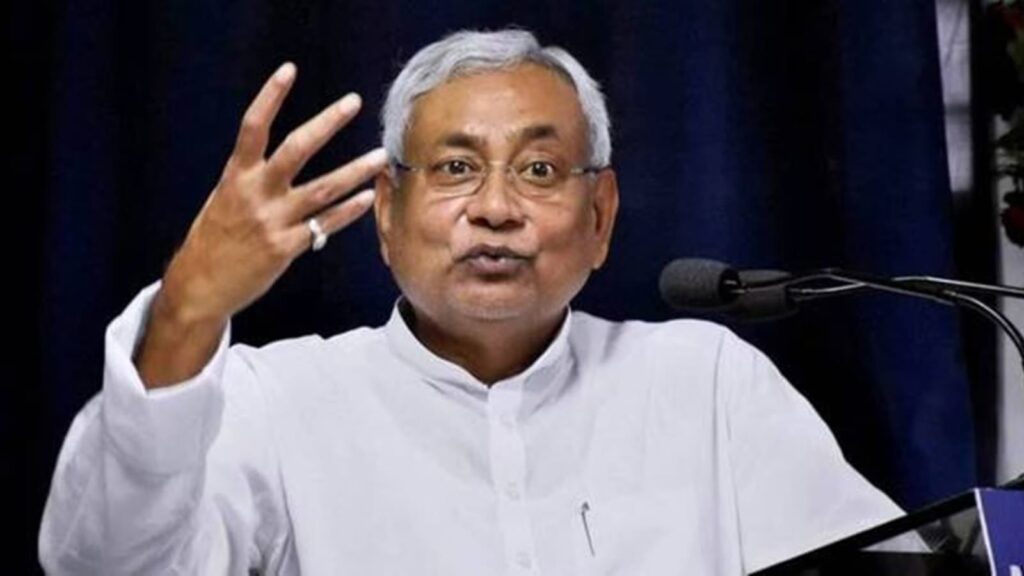Looking to deal the Opposition a major blow in the run-up to the Bihar Assembly elections, the Nitish Kumar government has taken a leaf out of the playbook that has served the BJP and the NDA well in other states: announce a string of schemes for women, a decisive demographic that is believed to have had a major impact in elections in states such as Maharashtra and Madhya Pradesh.
Hoping to keep his bastion intact, Kumar hit the ground running almost three months ago.
On June 24, the Cabinet approved raising monthly pensions for the elderly, widows, and those with disabilities from Rs 400 to Rs 1,100. The first instalment of this hike, totalling more than Rs 1,227 crore, was disbursed on July 11 directly into the accounts of some 1.11 crore beneficiaries of six schemes. Approximately 54.5% of these pensioners are estimated to be women, according to government data.
The following month, on July 8, the Bihar Cabinet imposed a domicile requirement on the existing 35% reservation for women in state government jobs. Now, only women who are residents of Bihar can claim the quota, with women from other states competing for the posts through the general category.
On July 30, Kumar increased the monthly honorarium for ASHA workers from Rs 1,000 to Rs 3,000 and doubled the incentives for Mamata (maternal health) workers from Rs 300 to Rs 600 per child delivery.
On August 29, the Cabinet approved the Mukhya Mantri Mahila Rozgar Yojana to spur women’s self-employment with a Rs 20,000 crore allocation. This was announced in a subsequent Cabinet meeting on September 2. Under this scheme, one woman in every family will receive an initial grant of Rs 10,000 to start an employment-generating activity of her choice. If the beneficiary’s business is running well six months later, she can receive an additional grant of up to Rs 2 lakh to expand it. Officials said the first round of tranches will be credited in September.
The government will also develop local “haat bazaars”, or small marketplaces, where women entrepreneurs can sell their products. The entire scheme is budgeted at Rs 20,000 crore from the state’s Contingency Fund, with the Bihar CM claiming that this programme is meant for broad-based empowerment and will help curb out-migration by creating jobs locally.
Story continues below this ad
On September 2, Prime Minister Narendra Modi also released Rs 105 crore as initial share capital for the Bihar Rajya Jeevika Nidhi Credit Co-operative Federation Limited. Commonly called the Jeevika Bank, this is a dedicated co-op bank for women’s self-help groups. Officials said the goal of the initiative was to give rural women, who are linked to Bihar’s Jeevika Self Help Groups (SHGs), easier access to credit at affordable rates. Nitish Kumar implemented the Jeevika programme in 2006 with financial assistance from the World Bank. Today, it has roughly 11 lakh SHGs with 1.4 crore women members.
More women are turning out to vote
Electoral trends across the past several polls have shown more women than men turning out to cast their ballots and this holds true for Bihar too. In the 2020 Assembly polls, 59.69% of women registered as voters in comparison to 54.68% men. The turnout figures showed the difference too, with women at 59.7% and men at 54.6%.
In the 2024 Lok Sabha polls, male voters only had a marginally higher turnout (65.80%) than female voters (65.78%).
An analysis of the 2014 and 2019 Lok Sabha polls has shown the increasing number of constituencies where women’s voter turnout exceeded that of men, despite their lower overall numbers on the electoral rolls. In both parliamentary elections, the highest number of such constituencies was in Bihar (10 in 2014 and 18 five years later). This illustrates that women’s vote is an almost decisive factor in the elections.
Story continues below this ad
Since coming to power in 2005, Kumar has carefully cultivated the women’s vote. Under him, in 2006, Bihar became the first state to reserve 50% of rural and urban local body seats for women. The same year, he introduced free bicycles for schoolgirls through the Mukhyamantri Balika Cycle Yojana, which provides a cash subsidy to female students enrolling in the ninth grade to purchase a bicycle. In 2016, the Nitish government also announced a 35% reservation for women in all state government jobs. Since 2018, under the Mukhyamantri Kanya Utthan Yojana, a monthly financial assistance has been given to girls until they complete their graduation.

